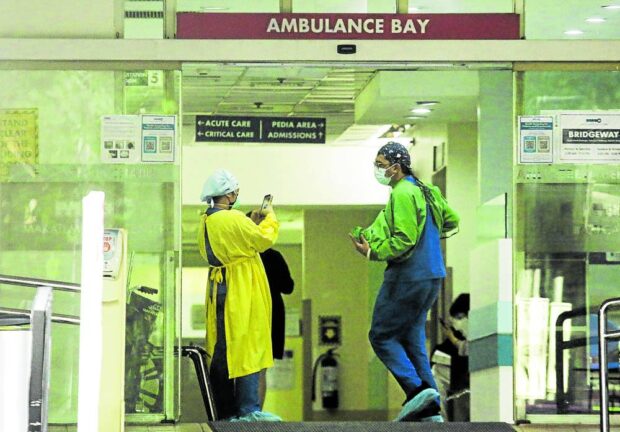Hospitals fear hacking may delay PhilHealth payment of arrears

RARE RESPITE | Emergency room personnel share a light moment at the ambulance bay of the Makati Medical Center. (FILE PHOTO)
MANILA, Philippines — The head of the Private Hospitals Association of the Philippines (PHAP) on Wednesday expressed concern that the Philippine Health Insurance Corp. (PhilHealth) might be unable to fulfill its promise of paying off most, if not all, of its P27-billion debt to health facilities by December after its online system was hacked last week.
In the “worst-case scenario,” Dr. Jose De Grano, PHAP president, said that patients of primary care facilities could end up paying for the health services and medicine they receive.
While De Grano was hopeful the ransomware attack would be resolved soon, he told reporters at the sidelines of a dengue forum that the PHAP was “expecting more delays” in payment.
“Small” hospitals or primary healthcare centers, he pointed out, would suffer the most as they would further bleed cash since their patients were mostly “charity” cases and beneficiaries of PhilHealth’s No-Balance Billing policy.
“These patients pay almost nothing. So if [PhilHealth] payments and processing of benefits will be further delayed, then their cash flow will be affected,” De Grano said, adding that private facilities receive no subsidy from the government.
PhilHealth’s arrears have ballooned to around P27 billion for both private and public health facilities over a five-year period. Of the total, P10 billion to P15 billion were for private hospitals.
Hackers’ demand
Emmanuel Ledesma Jr., PhilHealth president and CEO, told lawmakers during a House hearing on the health department’s 2024 budget that his agency would be able to pay most, if not all, of the P27 billion in 90 days.
PhilHealth has yet to confirm whether the hackers, identified as the “Medusa group” demanded $300,000 in exchange for the decryption keys and whether PhilHealth has paid or plans to pay the “ransom.”
In an interview on the ABS-CBN News Channel on Wednesday, PhilHealth spokesperson Israel Paragas assured members that their personal information and medical records were not compromised.
“Based on initial assessment, we noted that our databases are still intact, so we can say there is no leak with regard to personal information and medical information was not compromised,” he said.
However, at least 72 “workstations,” mostly in the PhilHealth headquarters and offices in Metro Manila, were “infected,” affecting the computers issued by the agency to its employees, Paragas added.
De Grano, meanwhile, urged PhilHealth to increase its over-a-decade-old case rates or benefits for dengue patients.
Warning signs
The state insurer covers up to P7,000 worth of medical expenses for members confined at primary care facilities and up to P10,000 for those seeking treatment at tertiary hospitals, or those equipped to handle various illnesses using more advanced equipment and therapies.
Its latest data showed 202,906 patient claims worth P1.93 billion for dengue cases last year, the second highest after pneumonia and acute gastroenteritis.
According to the Department of Health (DOH), a total of 125,975 cases of dengue were reported nationwide from Jan. 1 to Sept. 9.
“Most cases are those with warning signs, but cases without warning signs have been increasing since 2021,” said Angelica Garcia of the DOH’s epidemiology bureau in the same forum.
Individuals who had “warning signs” experienced acute fever for two to seven days, coupled with any of the following: abdominal pain, vomiting, lethargy, liver enlargement, mucosal bleeding, and increase or decrease in platelet count.
Most of the fatalities or 56 percent were children aged 9 and below, she added.